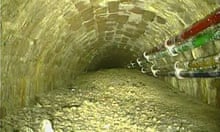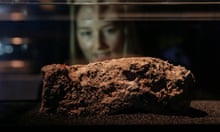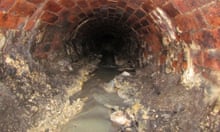Men using public toilets in London may soon be confronted with an unusual new arrival in their cubicles.
Sanitary bins, familiar for years in female loos, are poised to be introduced into male conveniences in an attempt to cut down on fatbergs in the capital’s sewers, if Greater London Assembly members have their way. Men use wet wipes too, as well as other products that can clog the sewers if they are flushed, not binned.
The call for new bins is part of a concerted effort, led by the assembly’s environment committee, to make people more aware of the damage caused by wet wipes and other materials that cause blockages when they find their way into the sewers.
Across the UK, more than 11bn wet wipes are used a year, up by a quarter from five years ago, and many people are unaware that they can’t be flushed. About 4bn disposable nappies are used, and sales of unflushable incontinence products, for men as well as women, has gone up by 50% to more than 1bn a year as the population ages. And in most public loos and toilets in restaurants, bars or offices, men have nowhere to dispose of such items except down the pan.
“Public awareness around single-use plastics, in terms of disposable water bottles and coffee cups, is high. But what about other daily products – wet wipes, nappies and period products?” asked Caroline Russell of the Green party, chair of the LGA environment committee. “We urgently need to educate people not to flush these items down the toilet, and take some practical steps to help the situation.”
Launched in the public toilets – female – in busy Leicester Square, the new wet wipe offensive aims to get people to “bin it, not flush it”.
Stephen Pattenden, waste network performance manager at Thames Water, said: “Many people don’t realise how wipes that get flushed can cause blockages and fatbergs in the sewers. They contain plastic, so don’t break down in the same way as toilet paper does. Instead, they cling to the insides of the pipes and combine with fat and grease to form the fatbergs, which have become so common across London.”
From one of its sites alone, Thames Water removes 30 tonnes a day of unflushable material, as well as unclogging five house blockages a day, up a third on last year. The rubbish costs £12m a year to clean up, which leads to higher bills.
Fatbergs have grown to such enormous size in London’s Victorian sewage pipes that a fragment of one is now a museum exhibit. Held together by fat dumped into the sewer system from domestic sources and eateries, they are made up largely of wet wipes.
The heatwave is also likely to have contributed to woes in the UK’s sewer systems. Hot dry weather means waste is not always fully flushed away and can become compacted. When sudden storms break, the rush of water meeting the dry compacted sewage can cause blockages and floods, or outflows of sewage into rivers.
Tuesday’s report calls on the government to bring in new labelling rules for disposable products. Wet wipes, despite the havoc they cause in sewers, are frequently labelled as flushable, which confuses consumers. Tampons contain about 5% plastic, and sanitary pads about 90%, while disposable nappies contain about 50%.
The report also calls for much more signage in public areas, informing people about the dangers of flushing wet wipes and other plastic-containing products.








